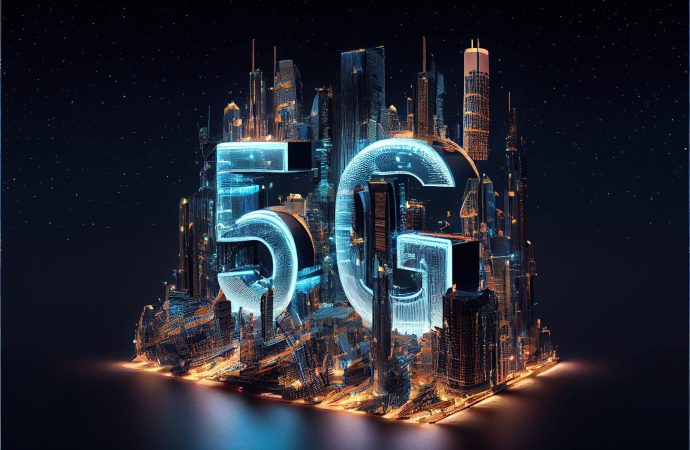Introduction The advent of 5G technology has generated a great deal of excitement across various sectors, and the entertainment industry is no exception. As the fifth generation of wireless technology, 5G promises to revolutionize the way we consume and interact with entertainment content. With its ultra-high speeds, low latency, and increased connectivity, 5G is set
Introduction
The advent of 5G technology has generated a great deal of excitement across various sectors, and the entertainment industry is no exception. As the fifth generation of wireless technology, 5G promises to revolutionize the way we consume and interact with entertainment content. With its ultra-high speeds, low latency, and increased connectivity, 5G is set to transform the landscape of the entertainment industry in unprecedented ways. This article will explore the multifaceted impact of 5G on entertainment, delving into its implications for content creation, distribution, and consumption.
Understanding 5G Technology

Image by: Google.com
Before diving into its impact on the entertainment industry, it is essential to understand what 5G technology entails. 5G stands for the fifth generation of mobile networks, succeeding the 4G LTE network. It offers significantly faster data transfer speeds, lower latency, and the ability to connect a vast number of devices simultaneously. These advancements are made possible through a combination of new frequency bands, advanced antenna technology, and improved network infrastructure.
Key Features of 5G

Image by: Google.com
- Ultra-High Speeds: 5G can deliver data speeds up to 100 times faster than 4G, reaching up to 10 Gbps. This enables seamless streaming of high-definition content and rapid downloads.
- Low Latency: Latency refers to the time it takes for data to travel from the source to the destination. 5G reduces latency to as low as 1 millisecond, making real-time interactions and streaming more responsive.
- Enhanced Connectivity: 5G can support a massive number of connected devices per square kilo meter, facilitating the growth of the Internet of Things (IoT) and smart devices.
- Improved Reliability: With advanced network architecture, 5G offers more stable and reliable connections, reducing the chances of interruptions and buffering.
Impact on Content Creation

Image by: Google.com
- High-Quality Content Production
One of the most significant impacts of 5G on the entertainment industry is the ability to produce high-quality content more efficiently. The increased data transfer speeds and low latency enable filmmakers, musicians, and game developers to collaborate in real-time, regardless of their geographical locations. This can lead to more innovative and diverse content as creators can share ideas and resources seamlessly.
- Virtual and Augmented Reality
5G technology is a game-changer for virtual reality (VR) and augmented reality (AR) experiences. The low latency and high bandwidth of 5G networks allow for more immersive and interactive VR and AR applications. This can revolutionize the way we experience movies, concerts, and video games, providing users with a more engaging and realistic experience.
- Cloud-Based Production
With 5G, cloud-based production tools can become more prevalent. Content creators can store and edit their work in the cloud, eliminating the need for expensive hardware and software. This can democratize content creation, allowing independent creators and small studios to produce high-quality content without significant financial investment.
Impact on Content Distribution

Image by: Google.com
- Streaming Services
The rise of streaming services has already transformed the entertainment industry, and 5G is set to take this transformation to the next level. The ultra-high speeds and low latency of 5G networks enable seamless streaming of 4K and even 8K content, providing viewers with a superior viewing experience. Additionally, 5G can reduce buffering and improve the overall quality of streaming services, making them more reliable and user-friendly.
- Live Events and Broadcasting
Live events, such as concerts, sports events, and award shows, can benefit immensely from 5G technology. The low latency of 5G networks allows for real-time broadcasting with minimal delays, providing viewers with a more immersive experience. Additionally, 5G can support multiple camera angles and interactive features, allowing viewers to customize their viewing experience.
- Mobile Entertainment
With the proliferation of smartphones and tablets, mobile entertainment has become increasingly popular. 5G can enhance the mobile entertainment experience by providing faster download speeds and smoother streaming. This can lead to the growth of mobile gaming, mobile TV, and other forms of on-the-go entertainment.
Impact on Content Consumption

Image by: Google.com
- Personalized Experiences
5G technology can enable more personalized entertainment experiences. With the ability to process and analyze vast amounts of data in real-time, entertainment platforms can offer personalized content recommendations based on users’ preferences and viewing habits. This can enhance user engagement and satisfaction.
- Interactive and Social Experiences
The low latency and high connectivity of 5G networks can facilitate more interactive and social entertainment experiences. For example, viewers can participate in live polls, quizzes, and discussions during a live event. Additionally, 5G can enable multiplayer gaming experiences with minimal lag, allowing players to interact and compete in real-time.
- Immersive Experiences
As mentioned earlier, 5G can revolutionize VR and AR experiences, providing users with more immersive and realistic entertainment. This can extend beyond gaming and movies to include virtual concerts, virtual theme parks, and other forms of immersive entertainment.
Challenges and Considerations

Image by: Google.com
While the potential of 5G in the entertainment industry is immense, there are several challenges and considerations to address.
- Infrastructure and Deployment
The deployment of 5G networks requires significant investment in infrastructure, including the installation of new antennas and base stations. This can be a time-consuming and costly process, particularly in rural and remote areas. Additionally, there are concerns about the environmental impact of 5G infrastructure.
- Data Privacy and Security
With the increased connectivity and data transfer speeds of 5G, there are heightened concerns about data privacy and security. Entertainment platforms must implement robust security measures to protect users’ data and prevent cyberattacks.
- Digital Divide
The rollout of 5G networks may exacerbate the digital divide, with urban areas gaining access to advanced technology while rural areas are left behind. This can create disparities in access to high-quality entertainment and other digital services.
Conclusion
The impact of 5G on the entertainment industry is profound and far-reaching. From content creation and distribution to consumption, 5G technology has the potential to transform the way we experience entertainment. While there are challenges to address, the benefits of 5G in enhancing the quality, interactivity, and personalization of entertainment are undeniable. As 5G networks continue to roll out globally, the entertainment industry is poised for a new era of innovation and growth.
















